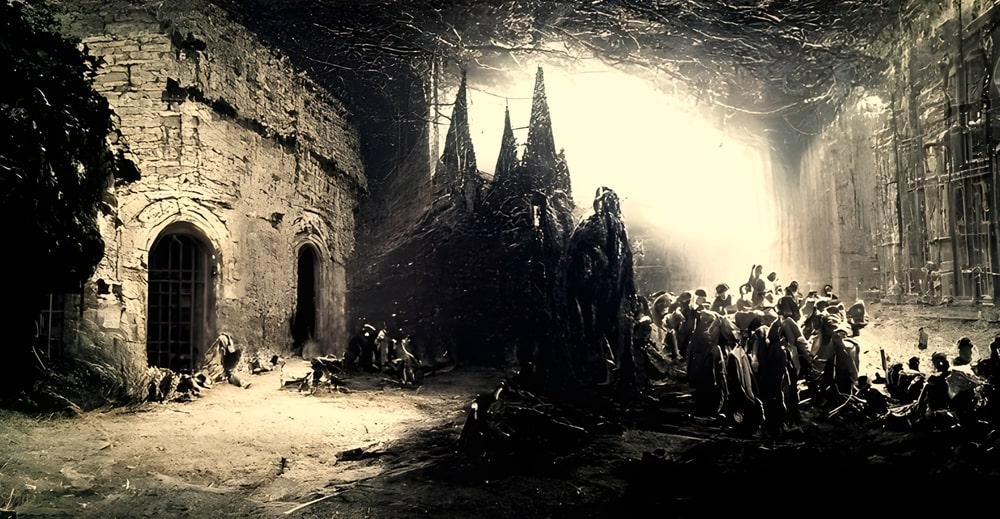While the Bible doesn’t really mention the exact word “purgatory,” it does make a reference to a place that can be misunderstood as what we know as purgatory. To claim that purgatory doesn’t exist just because the word doesn’t appear in Scripture is nothing but a failure to understand Scripture.
The Bible has many references to Christian doctrines, but somehow it fails to call them out by name. One might deny that there is something called the Bible, simply because there’s no such name in the Bible.
Even more, one might deny the Trinity, the Incarnation, and so forth simply because those exact words aren’t in the Bible. The name doesn’t make the place. If you think about it, the place has to exist, then we can give it a name.
We call it “purgatory” because it means “a cleansing place.” There, souls are purged from the small stains of sin, which is the number one blocker to heaven. Basically, they’re being waitlisted.

What does the Old Testament say?
The very first mention of purgatory in the Bible can be found in 2 Maccabees 12:46. “Thus he made atonement for the dead that they might be freed from sin.” Some people really don’t accept Maccabees as a book of the Bible.
This is quite unfortunate, especially since their Bibles have been edited and are also missing books. Catholic Bibles are different. Even if a person doesn’t accept the book of Maccabees, at least it has some historical value because we can learn what the pre-Christian community believed.
In Chapter 12 of the Second Maccabees, we finally read the Scriptural proof for Purgatory and evidence that the Jews sacrificed for those of their brothers who lost their lives in battle.
The Jews prayed for the dead, showing they believed in a place where they might be helped (which we now know as purgatory) and that the prayers of their living brothers and sisters could ultimately help them reach that place.
This is also very related to the Catholic doctrine of the communion of saints. During the Reformation in the 15th century, when Martin Luther decided to remove the books from the Bible, these words in the book of Maccabees clearly favored Catholic teaching, so the whole book was removed from the Protestant Bible.
Unfortunately for Protestants, even if they feel that the book wasn’t inspired, it still tells us about the practices of God’s chosen people.
In the New Testament
In Matthew 5:26 and Luke 12:59, Christ condemns sin and speaks of liberation only after expiation. “Amen, I say to you, you won’t be released until you’ve paid the last penny.” Now we know that no last penny needs to be paid in heaven. We also know that from Hell there isn’t any liberation. So the reference must apply to a third place.
Matthew 12:32 says, “Whoever speaks a word against the Son of Man will be forgiven. Whoever speaks against the Holy Spirit won’t be forgiven, either in this age or in the age to come. Here, Jesus speaks of sin against the Holy Spirit.
The implication is that there are some sins that can be forgiven in the next world. We also know that in Hell there isn’t any liberation, and in Heaven, nothing imperfect can enter it, as we see in the next part.
Sin can’t be simply forgiven when a soul reaches its final destination, simply because in heaven, there’s really no need for forgiveness of sin, and in hell, the choice to go there is already made.
Revelation 21:27 mentions how “nothing unclean will enter it, nor anyone who does abominable things or tells lies.” The place that is about to be entered (to which this passage refers) is heaven.
The Bible clearly points to a place for an intermediate state of purification after we die in the many passages that explicitly show that God will reward or punish according to a person’s life.

What if purgatory doesn’t exist?
Let’s think of the following example: Imagine a Christian man losing his temper and yelling at his next-door neighbor for letting their dog dig a hole in his yard. It is quite obvious that the man treated his neighbor rudely, but the neighbor’s behavior was also reprehensible.
His actions would be considered a light sin (also known as venial sin by the Catholic Church). It doesn’t have the same moral weight as theft or murder, but it’s still a sin. After shouting at the neighbors, with all the anger and stress in his body, the man comes back to his home and has a heart attack. He dies having committed a very small sin in the final moments of his life.
However, you need to remember that he is Christian and justified by the Lord. But yes, he did commit a sin. In this case, does he go to heaven or hell? Are all sins just as bad? The answer is no; not all sins are equally bad, and we all make mistakes and sin at the end of the day. If purgatory isn’t real, the man would go to hell for such a small sin.
God’s mercy is so wonderful, and our God is so just, that it seems quite unfathomable that he would condemn a justified man to hell for a small but unrepented sin. The man’s soul is dirty.
His actions might defile his soul, but not to the point where he has cut himself off from God. Because only mortal sins cut off someone right away from God’s grace. A man is destined for heaven if his soul isn’t defiled by his sin.
His soul is deeply in need of cleansing because nothing delifed can truly enter heaven. This is the sole purpose of purgatory anyway. Out of mercy and love, God sends the man through purgatory so his soul can be purified to be able to join God in heaven.
Remember, purgatory isn’t a second chance for conversion. The man is already justified. If there’s no other place for an intermediate state of purification, we would definitely be damned to hell! Who would be saved, then?
Those who teach against purgatory also teach an unreasonable doctrine. So, the question is, why do non-Catholics reject this teaching full of consolation? Well, my best guess is that they want to believe that the merits of Christ applied to the sinner who trusts in Him will remove all sin past, present, and future and abdicate from all responsibility for sin after justification.
But this is fairly unreasonable. Only Jesus’ death on the cross makes us worthy. Without him, we wouldn’t be able to stand before him. We need Jesus Christ. However, we also have personal responsibility for our justification before the Lord.
Our acceptance of the sacrifice of Christ on the cross doesn’t abdicate our responsibility to live the gospel. Also, salvation isn’t assured. Salvation isn’t by faith alone, since the Bible says that we will be held accountable by our words and that much is to be entrusted to us. Nowhere in the Bible does it say that salvation is by faith alone. This teaching is fairly unscriptural.
Rather, the Scriptures say that faith without works is basically dead. As Jesus can be the only acceptable sacrifice to God for our own sins, it doesn’t really give us a license to sin. However, does the justification by the Lord keep us away from sin? Even a justified man can commit a sin.
Therefore, even if Christ’s blood on the cross makes us right before God, He still requires much from us in return. He requires us to die to ourselves every day and to choose him in every single thing we do. It doesn’t fit with God’s justice for someone to be off the hook just because they were justified in the past.

















